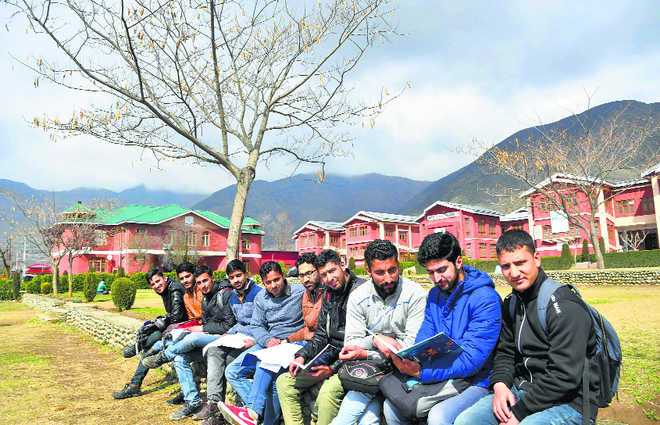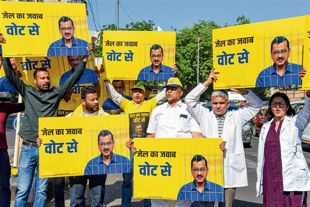
Humanities helps sift the chaff and bridge the gaps as it trains students to straddle different worlds simultaneously
Jayanti Roy
What makes humans, human? Of course it is their sharp intellect, ability to use tools and adapt the environment to suit their needs. However, in the past 200 or so years, humans have manifested such unique ideas as human rights, equality, democracy, citizenship etc. and have tried to implement these in real situations. This premise leads us to the indispensability of individuals with deeper cognition of myriad human facets, skills of using tools to tackle multi-layered problems and fine sensibilities to quickly catch the finer nuances — individuals trained in both traditional as well as emerging disciplines of humanities.
SUBJECT MATTER
It can be predicted that workplaces, schools, educational institutes, research organisations, offices and industries will be peopled with such individuals practicing Humanities. Humanities include the core subject areas under anthropology, art and music, economics, education, geography, history, language and literature, philosophy, psychology, political science, public administration, sociology and several new off-shoots originating from the core such as religious studies, gender studies, human rights and duties, social work, disaster-management, defence-studies, police administration etc.
The emerging trend in humanities nowadays is the inter-disciplinary approach where areas, hitherto considered far removed from each other are being brought together to address new challenges, questions of identities and unforeseen complexities. Environmental humanities, digital humanities, medical humanities are some such areas.
TOWARDS ANALYTICAL THINKING
While studying humanities one has the advantage of developing analytical thinking skills, art of succinct articulation, while not compromising on one's inner curiosity and creativity. Good teachers of humanities can lead the students to develop keen observation, abilities to see things beyond the obvious and through facades and veneers. This training not only helps them to be effective in their careers alone but also to carve out a holistic mindsetl.
WIDE CAREER SCOPE
The careers one can carve out of a thorough training in humanities have a wide range as it can serve the objectives of the domains of education, health, governance, media, research, social work and in fact even in non-arts areas. Humanities graduates and post-graduates get opportunities to work at exciting interfaces of science and society, hubs of media activity, political hotspots, national policy making center and in the very core of governance. They also have the option to work with the underprivileged, marginalised sections, tribal communities, and vulnerable groups. There are chances of being pioneers in the domain because the present era is that of unforeseen upheavals emerging due to the tectonic shifts in the social, political and economic aspects of the society.
— The writer is Dy Director, Human Resource Development Centre, Panjab University, Chandigarh
NO CONFLICT WITH SCIENCE
Humanities as a stream should not be seen as rival to Science in a vis-à-vis situation, neither should it be antagonistic to technology's immense potential to lend itself easily to applications in the form of products, process and procedures. To the objective eye of science, humanities provide the human prism. To the amoral and value neutral technology, which does not encounter any ethical dilemma in its applications, humanities can make us see the thin line between right and wrong, good and evil and guide the human kind towards a mature, responsible and egalitarian world.
The whole world and the systems therein are becoming fuzzier and less clearly defined due to the onslaught of technology and massive shifts. Concepts, ideas and definitions no longer fit neatly into clear boxes but flow into each other fluidly, overlapping at some points while leaving lacunas at other. Humanities help us sift the chaff and bridge the gaps, as its training trains to straddle different world simultaneously and handle ambiguity. Methods of humanities, too, are scientific, logical, rational and evidence-based, with the added advantage of being able to fine tune the findings or decisions with local history, group politics or community culture. It makes the choices more effective, vibrant and tailor-made and prevents the folly of taking 'one-size-fits-all' decisions. The consideration of qualitative aspects in addition to quantitative statistics based big data is the strength on which humanities banks on to bring clarity to its approach.
... And the LIBERAL perspective
Sankar Krishnan
In an environment where the only constant is change, it becomes imperative to re-examine how we are training our young people to face the world. Traditionally, higher education has focused on content and depth of knowledge. The assumption was that this would help them hit the road running at the workplace. However, increasingly, as information becomes freely available on the world wide web it is clear that this is no longer the method to best prepare young people for the challenges of the 21st century. Instead of being content-focused, and teaching them what to think, we need to equip them with the skills that will teach them how to think. This is where a liberal arts and sciences education comes in.
Chance to explore
In a liberal education set up, students have the ability to explore a number of subjects and areas of study. They can choose a mix of courses from subjects as diverse as the arts, computers, humanities, languages, mathematics, natural or 'hard' sciences, and social sciences, while at the same time going deep into a particular area of specialisation. In today’s workplace, problems are not related to only a single field of study and to succeed in this environment, a person needs to be aware of developments across many fields, and take an integrated perspective on issues.
Catalyst for creativity
Besides facilitating a multi-disciplinary approach, a liberal arts and sciences education stimulates critical as well as analytical thinking skills. The pedagogy is designed to encourage creativity and curiosity, reasoned and logical questioning rather than the mere acceptance of facts. The idea is to endow the students with the capacity to think independently; to help them move from an examination- oriented, structured environment to new ways of studying and working with their peers in a learning-focused, growth-oriented system that enables them to think and learn across different disciplines. The skills they pick up in the process will equip these students with the agility and flexibility to respond and adapt to different kinds of challenges in life.
Inclusive approach
The third part of the preparation to being a future leader is the ability to work in cross-border teams with people from different parts of the world. Many liberal education-oriented universities today focus on experiential learning, with projects and teams, as well as offer an opportunity to interact with students and teachers in other parts of the world. These help broaden the perspectives of students, so that they are able to have an approach that marries local sensibilities with a global outlook.
Prepared for life
Till now we have focused largely on how a liberal education helps in preparing students for their working lives ahead. More importantly, it provides students with a nuanced exposure to the world around them, training them not only towards accomplishing narrow career goals, but also towards making socially relevant contributions. Students become more sensitised to issues and they are willing to work for common betterment rather than just their own individual goals. An education in liberal arts and sciences will equip you to work and succeed in a world of conflicts.
— The writer is Pro-Vice-Chancellor, Ashoka University, Sonepat
Selecting the subject
Universities offering liberal arts degrees usually offer a combo of major and minor subject combos to students. A major is the subject in which a student will earn a bachelors' degree — either a BA or a BSc. Although students can take courses toward their specialisation before formally declaring the major at the end of the third semester, it is only in the last three semesters that they will be taking courses predominantly in their major subject.
So, you might be offered majors in nine subjects and inter-disciplinary majors in a further 8 subjects, thereby having a total of 17 options to major in. Students can also pick minors from among 15 courses on offer.
The Majors available at the undergraduate level are:
Computer Science (BSc. Hons.), Economics (BA Hons.), English (BA Hons.), History (BA Hons.), Mathematics (BSc. Hons.), History and International Relations (BA Hons.), Politics, Philosophy and Economics (BA Hons.), Politics and Society (BA Hons.), Philosophy (BA Hons.), Political Science (BA Hons.), Psychology (BA Hons.), Sociology/Anthropology (BA Hons.), Computer Science and Entrepreneurship (BSc. Hons.), Economics and Finance (BSc. Hons.),Economics and History (BA Hons.), English and Journalism (BA Hons.), Physics (BSc. Hons), Biology (BSc. Hons), English and Creative Writing (BA Hons.)
ashoka university, sonepat
Estd: 2014
Website: https://www.ashoka.edu.in
The university focuses on providing a liberal education at par with the best in the world with emphasis on foundational knowledge, thorough academic research. At UG level the university requires each student to take all of its 12 Foundation Courses, though in no specific order.
PG govt college for girls,
sec 42, chandigarh
Estd: 1982
Website: http://www.gcg42.ac.in
The college has been ranked 32 in NIRF-2018. With the vision to add more career-oriented programmes, the college intends to apply for BVoc courses in Travel and Tourism and Stock Market and Trading Operations,” said Prof Binu Dogra, Principal of the college.
Institute of Social Science Education and Research (ISSER), Panjab University, Chandigarh
Estd: 2015
Website: isser.puchd.ac.in
The Integrated five- year Honours programme provides foundational knowledge in geography, history, economics etc, along with an introduction to main concepts in psychology, philosophy and natural sciences.
St Bede’s, Shimla
Estd: 1904
Website: www.stbedes.catholic.edu.au/
Only college in Himachal Pradesh to be accredited ‘A plus’ Grade by UGC NAAC and is in the select band of 19 prestigious colleges which have been accredited “heritage status” by UGC. The college has successfully implemented RUSA and Choice Based Credit Based System (CBCS), introduced by Himachal Pradesh University.
Govt College for Women,
Srinagar
Estd: 1952
website: http://gcwmaroad.org
The most popular courses of the college include Bachelor’s in Mass Communication and Multimedia Production (MCMP), B.A, and Honors in English and BCA. The college also offers few postgraduate and integrated courses in Science and English.
Region’s best
Government College for Girls, Chandigarh
Estd: 1965
Website: www.gcg11.ac.in
BBK DAV College for Women, Amritsar
Estd: 1967
Website: www.bbkdav.org,
Government College for Girls,
Ludhiana
Estd: 1943
Website: gcgldh.org
Government Rajindra College, Bathinda
Estd: 1940
Website: www.grcb.ac.in
DAV College for Girls,
Yamunanagar
Estd: 1958
Website: davyamunanagar.in
Mahadevi Kanya Pathshala (PG) College, Shimla
Estd: 1902
Website: mkpcollege.in
Government College,
Dharamsala
Estd: 1926
Government College For Women, Gandhi Nagar, Jammu
Estd: 1969
Website: gcwgandhinagar.com
Government Degree College,
Bemina, Srinagar
Estd: 1972
Website: www.gdcbemina.com
Mahadevi Kanya Pathshala (PG)
College, Dehradun
Estd: 1902
Website: http://mkpcollege.in
Shri Guru Ram Rai
PG College, Dehradun
Estd: 1960
Website: www.sgrrcollege.com



























